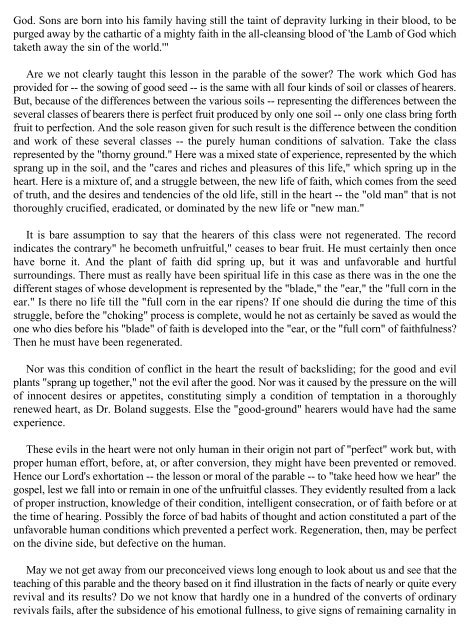Scriptural Sanctification - Media Sabda Org
Scriptural Sanctification - Media Sabda Org
Scriptural Sanctification - Media Sabda Org
Create successful ePaper yourself
Turn your PDF publications into a flip-book with our unique Google optimized e-Paper software.
God. Sons are born into his family having still the taint of depravity lurking in their blood, to be<br />
purged away by the cathartic of a mighty faith in the all-cleansing blood of 'the Lamb of God which<br />
taketh away the sin of the world.'"<br />
Are we not clearly taught this lesson in the parable of the sower? The work which God has<br />
provided for -- the sowing of good seed -- is the same with all four kinds of soil or classes of hearers.<br />
But, because of the differences between the various soils -- representing the differences between the<br />
several classes of bearers there is perfect fruit produced by only one soil -- only one class bring forth<br />
fruit to perfection. And the sole reason given for such result is the difference between the condition<br />
and work of these several classes -- the purely human conditions of salvation. Take the class<br />
represented by the "thorny ground." Here was a mixed state of experience, represented by the which<br />
sprang up in the soil, and the "cares and riches and pleasures of this life," which spring up in the<br />
heart. Here is a mixture of, and a struggle between, the new life of faith, which comes from the seed<br />
of truth, and the desires and tendencies of the old life, still in the heart -- the "old man" that is not<br />
thoroughly crucified, eradicated, or dominated by the new life or "new man."<br />
It is bare assumption to say that the hearers of this class were not regenerated. The record<br />
indicates the contrary" he becometh unfruitful," ceases to bear fruit. He must certainly then once<br />
have borne it. And the plant of faith did spring up, but it was and unfavorable and hurtful<br />
surroundings. There must as really have been spiritual life in this case as there was in the one the<br />
different stages of whose development is represented by the "blade," the "ear," the "full corn in the<br />
ear." Is there no life till the "full corn in the ear ripens? If one should die during the time of this<br />
struggle, before the "choking" process is complete, would he not as certainly be saved as would the<br />
one who dies before his "blade" of faith is developed into the "ear, or the "full corn" of faithfulness?<br />
Then he must have been regenerated.<br />
Nor was this condition of conflict in the heart the result of backsliding; for the good and evil<br />
plants "sprang up together," not the evil after the good. Nor was it caused by the pressure on the will<br />
of innocent desires or appetites, constituting simply a condition of temptation in a thoroughly<br />
renewed heart, as Dr. Boland suggests. Else the "good-ground" hearers would have had the same<br />
experience.<br />
These evils in the heart were not only human in their origin not part of "perfect" work but, with<br />
proper human effort, before, at, or after conversion, they might have been prevented or removed.<br />
Hence our Lord's exhortation -- the lesson or moral of the parable -- to "take heed how we hear" the<br />
gospel, lest we fall into or remain in one of the unfruitful classes. They evidently resulted from a lack<br />
of proper instruction, knowledge of their condition, intelligent consecration, or of faith before or at<br />
the time of hearing. Possibly the force of bad habits of thought and action constituted a part of the<br />
unfavorable human conditions which prevented a perfect work. Regeneration, then, may be perfect<br />
on the divine side, but defective on the human.<br />
May we not get away from our preconceived views long enough to look about us and see that the<br />
teaching of this parable and the theory based on it find illustration in the facts of nearly or quite every<br />
revival and its results? Do we not know that hardly one in a hundred of the converts of ordinary<br />
revivals fails, after the subsidence of his emotional fullness, to give signs of remaining carnality in
















